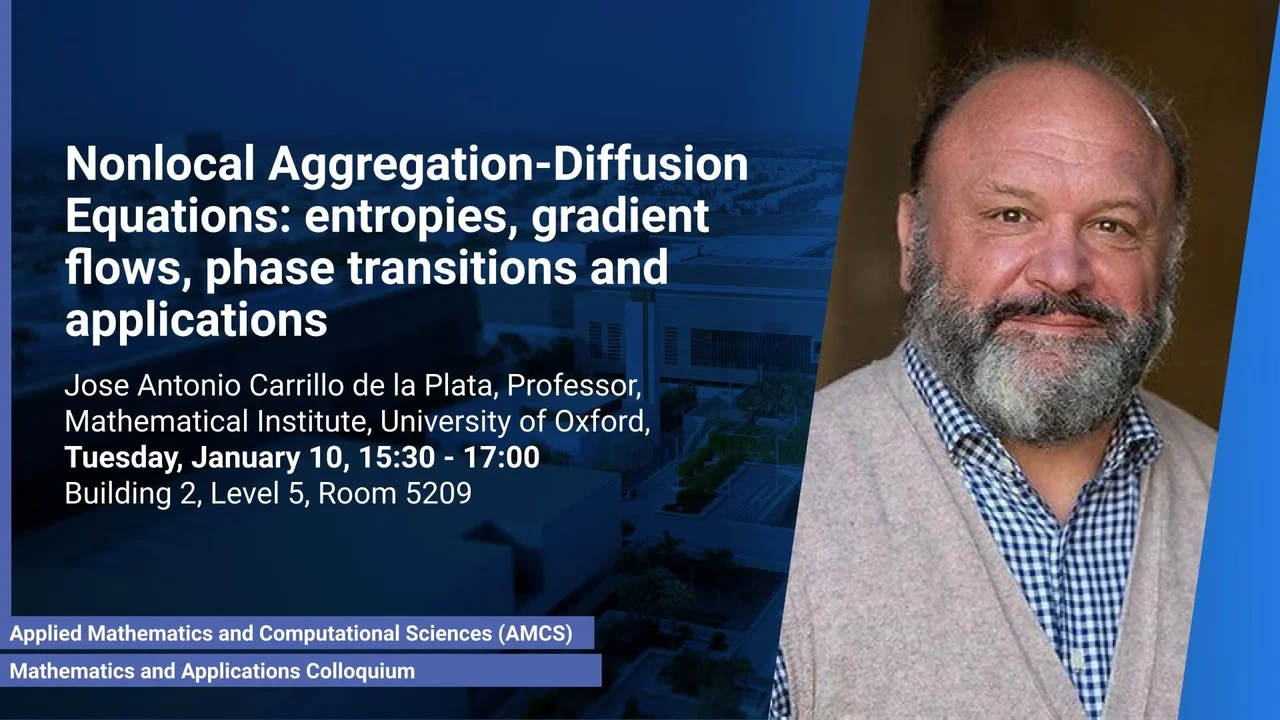
Nonlocal Aggregation-Diffusion Equations: entropies, gradient flows, phase transitions and applications
- Prof. Jose Carrillo, Department of Mathematics, University of Oxford, UK
B2 L5 R5209
This talk will be devoted to an overview of recent results in understanding the bifurcation analysis of nonlinear Fokker-Planck equations arising in a myriad of applications such as consensus formation, optimization, granular media, swarming behavior, opinion dynamics, and financial mathematics to name a few. We will present several results related to localized Cucker-Smale orientation dynamics, McKean-Vlasov equations, and nonlinear diffusion Keller-Segel-type models in several settings. We will show the existence of continuous or discontinuous phase transitions on the torus under suitable assumptions on the Fourier modes of the interaction potential.
Overview
Abstract
This talk will be devoted to an overview of recent results in understanding the bifurcation analysis of nonlinear Fokker-Planck equations arising in a myriad of applications such as consensus formation, optimization, granular media, swarming behavior, opinion dynamics, and financial mathematics to name a few. We will present several results related to localized Cucker-Smale orientation dynamics, McKean-Vlasov equations, and nonlinear diffusion Keller-Segel-type models in several settings. We will show the existence of continuous or discontinuous phase transitions on the torus under suitable assumptions on the Fourier modes of the interaction potential. The analysis is based on linear stability in the right functional space associated with the regularity of the problem at hand. While in the case of linear division, one can work in the L2 framework, nonlinear diffusion needs the stronger Linfty topology to proceed with the analysis based on the Crandall-Rabinowitz bifurcation analysis applied to the variation of the entropy functional. Explicit examples show that global bifurcation branches can be very complicated. The stability of the solutions will be discussed based on numerical simulations with fully explicit energy-decaying finite volume schemes specifically tailored to the gradient low structure of these problems. The theoretical analysis of the asymptotic stability of the different branches of solutions is a challenging open problem.
Brief Biography
José A. Carrillo is currently a Professor of the Analysis of Nonlinear Partial Differential Equations at the Mathematical Institute at the University of Oxford and a Tutorial Fellow in Applied Mathematics at The Queen's College. He previously held academic positions at Imperial College London, Universitat Autònoma de Barcelona, and Universidad de Granada, where he did his Ph.D.
He served as chair of the Applied Mathematics Committee of the European Mathematical Society from 2014-2017. He was the chair of the 2018 Year of Mathematical Biology. He was the Program Director of the SIAM activity group in Analysis of PDE 2019-2020. He has been elected as a member of the European Academy of Sciences, Section Mathematics, in 2018 and SIAM Fellow Class 2019. He is currently the head of the Division of the European Academy of Sciences, Section Mathematics, and a Foreign Member of the Royal Academy of Sciences of Spain since 2021.
